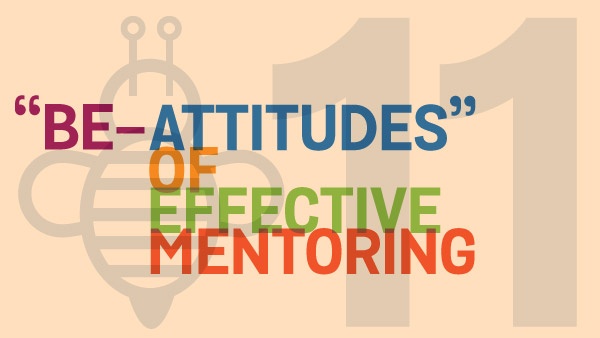
by Monty Kelso (nationally recognized coach, modern worship curator and president of the Slingshot Group, a staffing and coaching firm)
1. Be confident.
Although there may be times you feel you don’t have much to offer, you should realize that age and experience alone qualify you. If you prefer the other person first and look out for their interests, you will be in the right frame of mind to offer (with humility) wisdom, insight, and counsel that will ultimately help the “mentoree” in their “becoming” process.
2. Be consistent.
The best mentoring doesn’t happen by backing up your mental dump truck and burying someone with lofty solutions. For example, Ryan is what I call a "saturated learner." He is already smart, talented, and catches on easily. Though not formally educated, he’s learned much through life experience, good parenting, and an inquisitive spirit. Much of what I would be tempted to teach him directly (in big heaps) would just be mere “run off.” He absorbs much in small doses of life encounters, ultimately saturating him with my influence little by little.
3. Be accessible.
Be fully present when you are accessible. Assuming that the person is eager to be mentored by you, intentionally create enough space for conversation. These “convos” might take on a different bent each time you meet. Ample time allows for what might naturally happen, and more importantly, the supernatural. Sometimes, these convos are light-hearted. Other times may be chatty catch-up with no measurable “ahas.” Still other times, at least on occasion, you will experience those deep-dive, crucial conversations guided by the Holy Spirit, resulting in soul transformation. Little by little, like iron sharpening iron, refinement comes.
4. Be discerning.
I often pray for both wisdom and discernment before I show up for a mentoring “appointment.” I ask God to give me the ability to love deeply, see clearly, and behave humbly. I seek to read between the lines, discerning what is both spoken and unspoken at first glance. It is at that point I determine if I will play the role of the activator or responder. Will I let him spew or will I poke and prod with questions? Better yet, will she show up already mindful of her own questions? Bottom line, I want to respond to those things that concern him or her most. This is the “secret sauce” of time well spent.
5. Be aware.
There must be a hunger to engage, demonstrated by the initiative coming from the “mentoree.” If he/she doesn’t want it, it can’t be forced. I believe the optimal way to mentor younger people happens when we work, serve, and regularly hang out together as friends and family, “doing life.” Throughout the last four years of our relationship, Ryan and I have needed to honestly acknowledge the ebb and flow of our mentoring relationship. Awareness suggests that you know when it is time to redefine, and in some cases dissolve, the mentoring dimension of the relationship. And that’s okay.
6. Be inquisitive:
Learn to ask great questions. You know growth is happening when those you mentor are curious. When they come with questions of their own, your ability to resist the immediate answers, full of antidotes, will likely change the course of your conversation from skimming to a deep dive. Instead, ask, in return, questions that poke and prod at his/her reasons and motives behind the questions. This approach unlocks great talks, resulting in transformational discoveries and breakthroughs. However, resist the temptation to settle the tension quickly. Embrace the process.
7. Be hospitable:
Open your home. The greatest mentoring will sometimes happen when they see you off the clock and doing life in the “in between.” Ryan reminds me that the best mentoring happens by watching me “do life,” rather than any of our regularly scheduled meet ups. Beware! This means they will watch you fail.
8. Be vulnerable.
Let them know where you struggle and where you have failed. This includes real time struggles and failures. How you handle your present-day struggles teaches them more than your “I remember when” stories. Further, your past failures (and how you handled them) sometimes carry more mentoring weight than your past trophies. If you try to stay on the pedestal they might place you on, your mentoring relationship is probably short-lived, a fleeting encounter, riddled with disappointment. I’ve never seen those I mentor more attentive than when I pull the curtain back on my own life, revealing my own struggles and failures.
9. Be bold.
Don’t be afraid to call them out when you observe something that should be brought to their attention. As you develop trust, you will have the relational equity to cash in on some teachable moments. If your crucial conversations are couched in good timing, affirmation, genuine love, and a non- judgmental tone, you will likely find them thanking you for caring enough to drill into the situation.
10.Be a promoter.
As a mentor, your encouraging words, publicly and privately, hold great weight in the minds of those you mentor. Just like parenting a child, your words and actions play a big part in their developing a healthy self-perception. How you lead them into their “becoming” matters greatly to them. Speak often about what you see them becoming, what you could imagine them accomplishing. More importantly, though, take a faith risk now and then by providing an opportunity for them to move beyond what is comfortable to that which will remind them they are still learning and growing. When they “kill it,” celebrate big. When they fail, love them and unpack the reasons behind the so-called failure. Most important, encourage them to try again, knowing that they will succeed.
11. Be teachable.
I wanted to stop at number 10. It’s such a nice round number. But this one is important and should not be overlooked. Reverse mentoring is inevitable. I learn much from those I mentor. There are many moments when I am clearly the primary beneficiary of the relationship. I love when that happens. My close friendships with young champions like Ryan make me a better person, as I intentionally stay open to learning fresh perspectives and practices from them, seeking to understand their worldviews, new methods of communication, spiritual perspectives, social trends, technology, and art.
This blog is excerpted from Mentoring Worship Leaders: Training the Next Generation, compiled and edited by Tom Kraeuter. This collection--along with many other excellent worship leader books, DVD's and consulting materials--are available online at www.training-resources.org.
--For more practical articles on team building for choir directors and worship leaders, go to discoverworship.com











